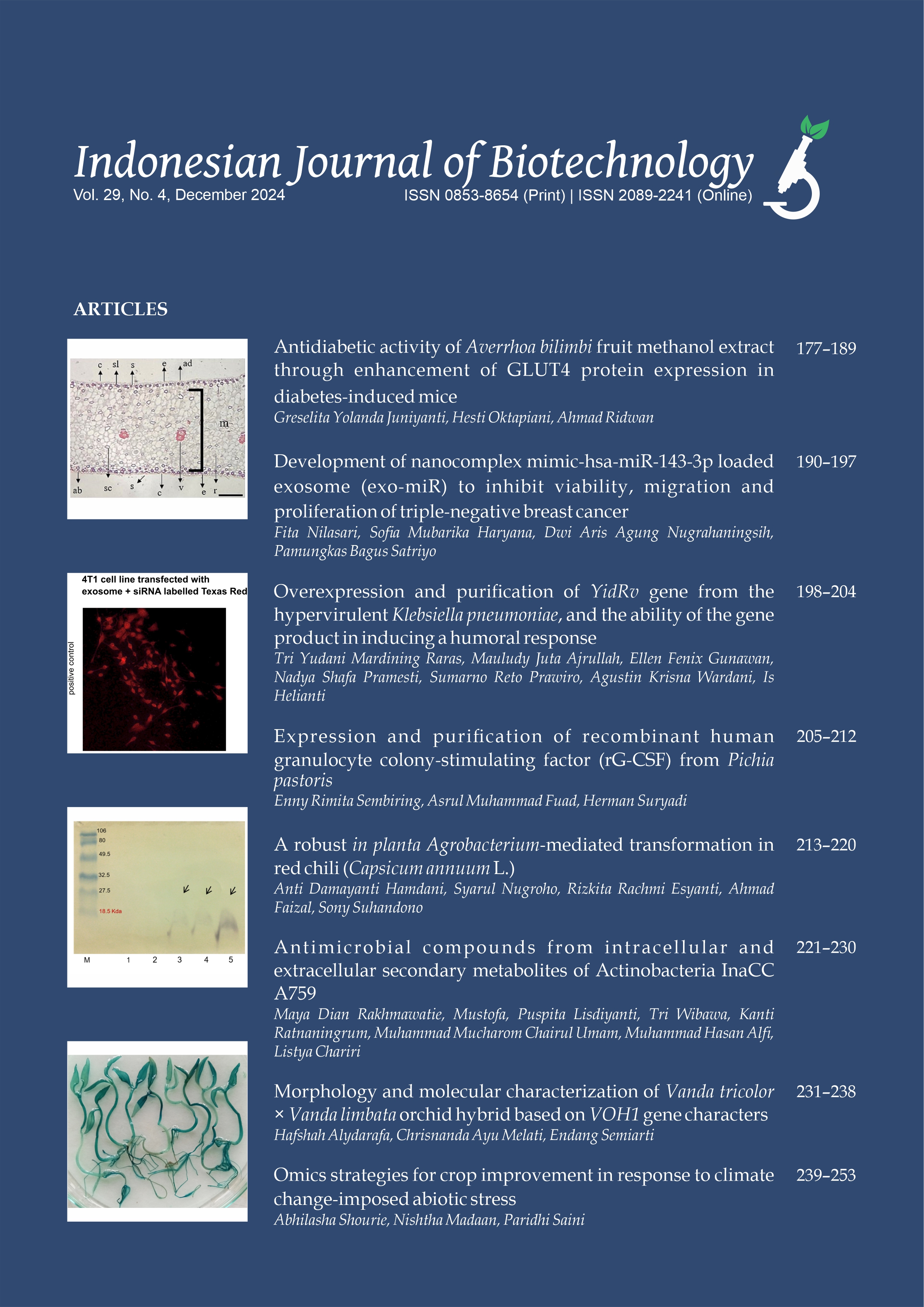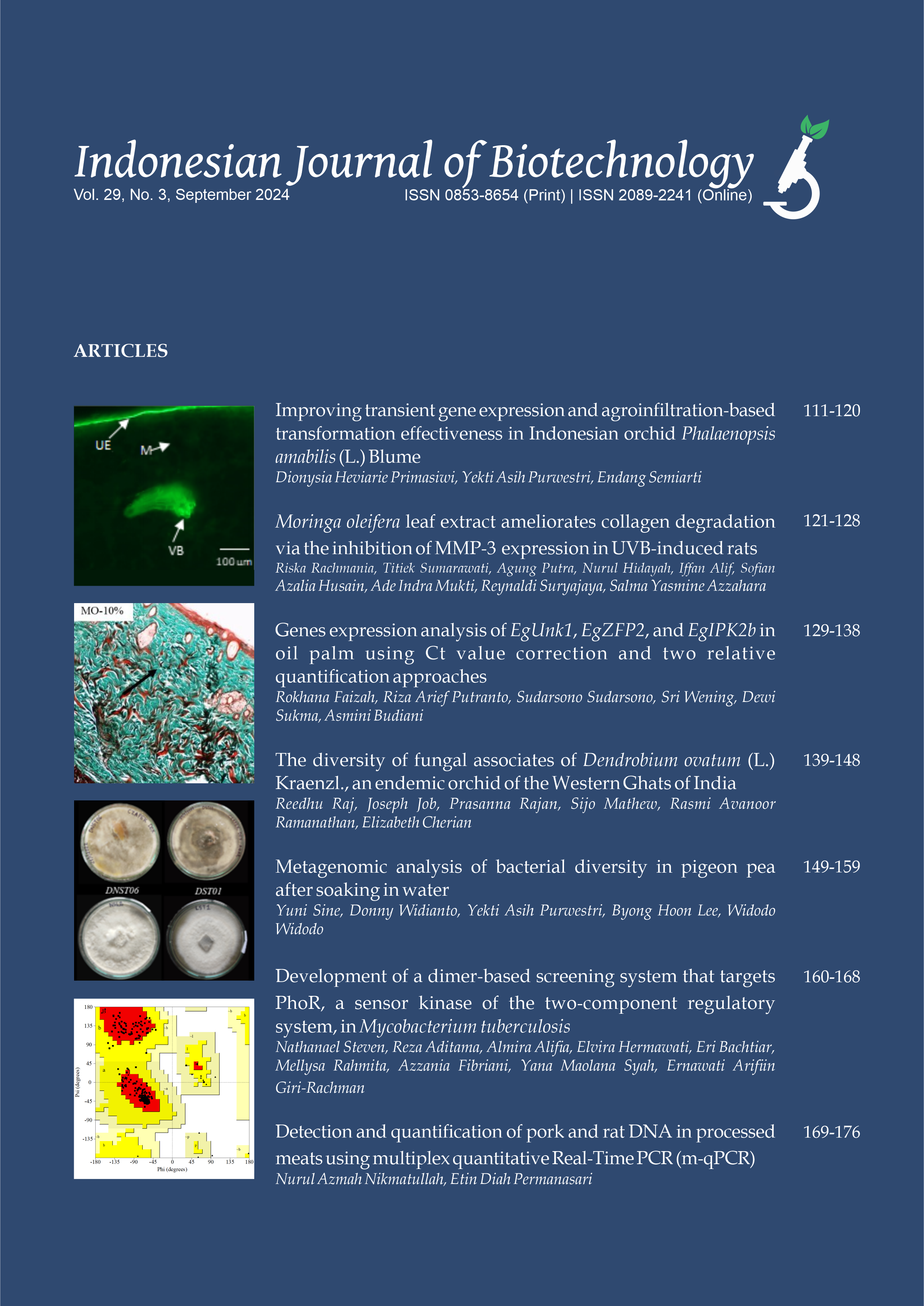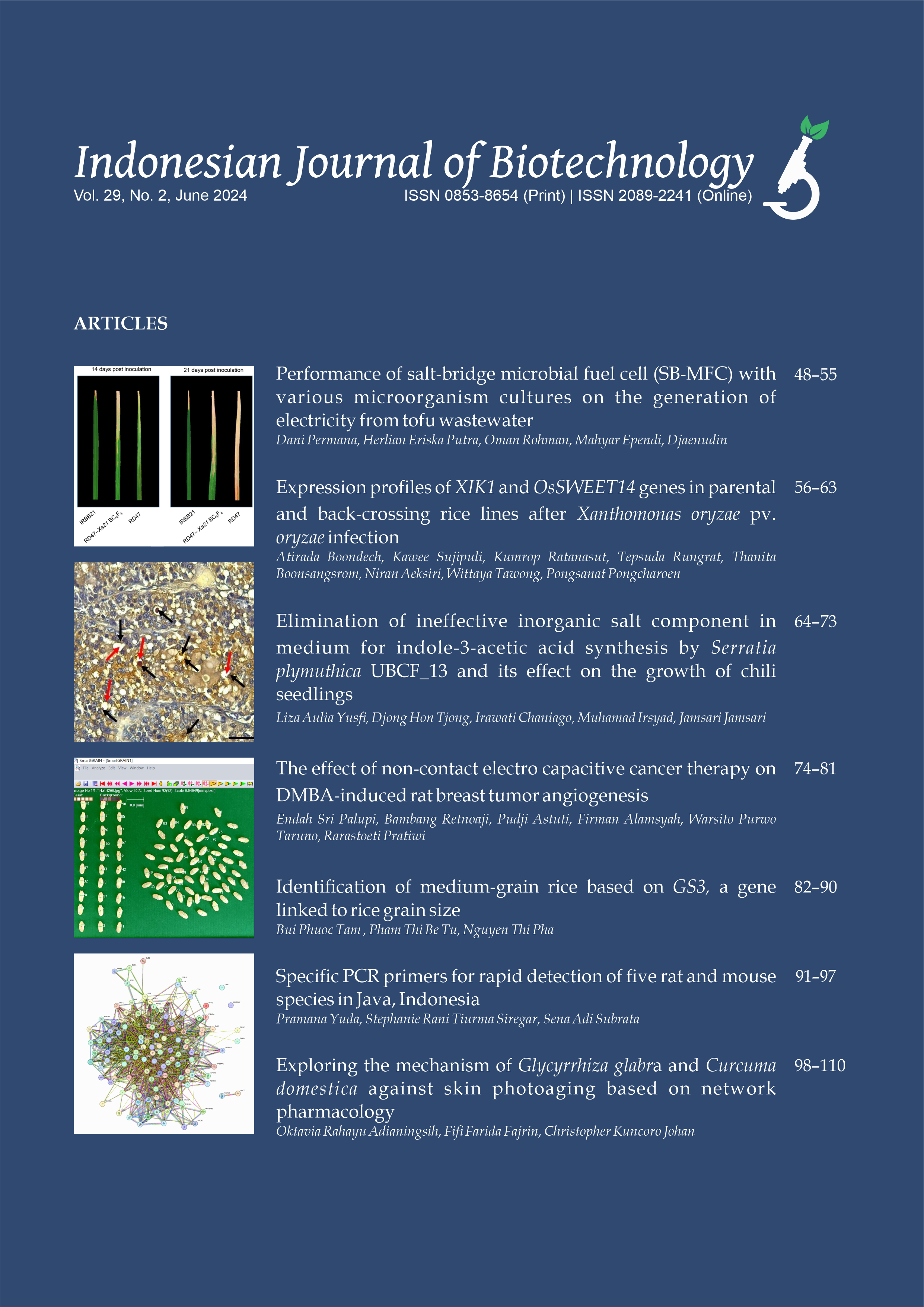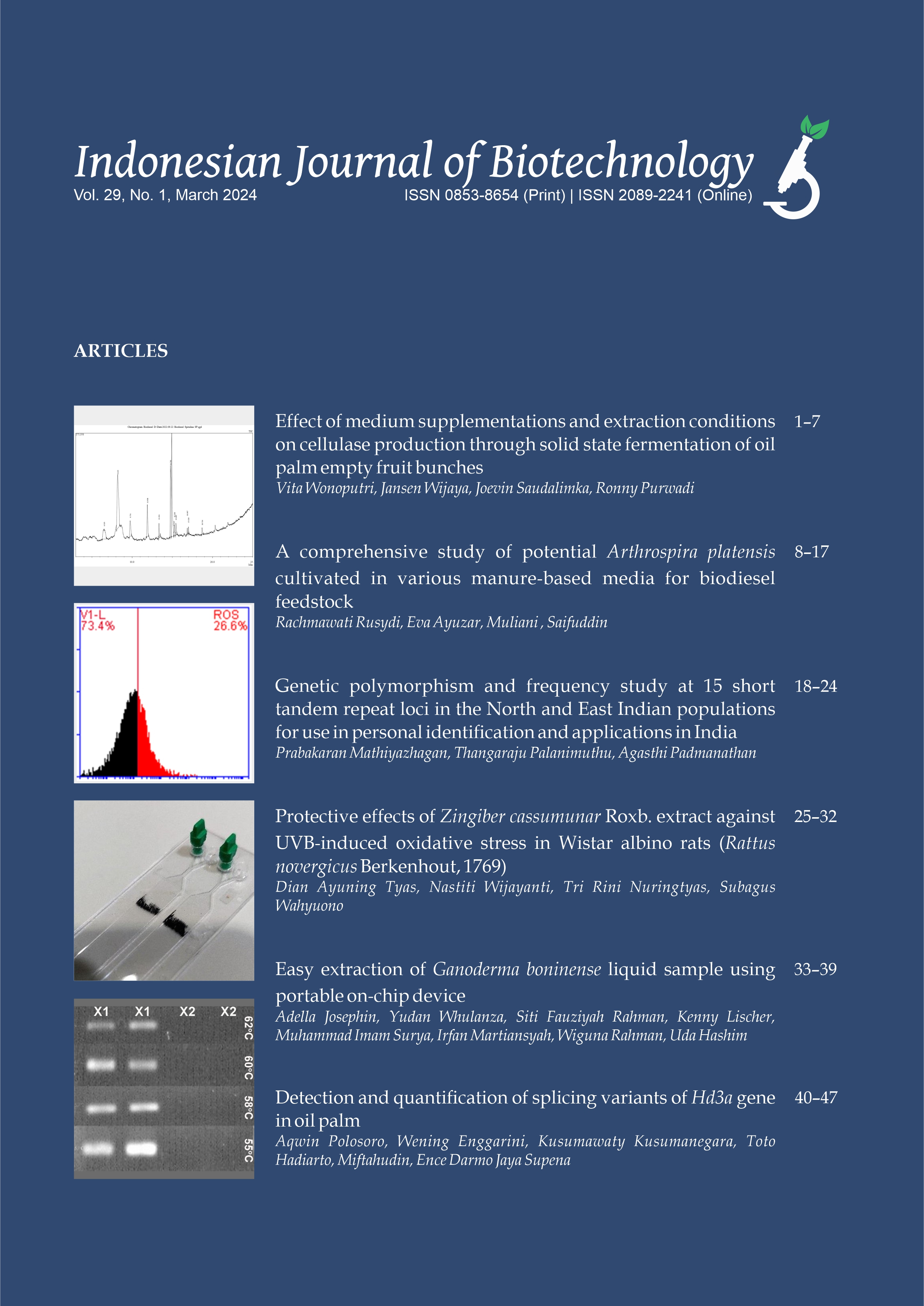Secretory expression of human insulin precursor in Pichia pastoris employing truncated α-factor leader sequence and a short C-peptide
Dini Nurdiani(1*), Hariyatun Hariyatun(2), Wien Kusharyoto(3)
(1) Research Center for Biotechnology, Indonesian Institute of Sciences, Jalan Raya Bogor Km. 46, Cibinong 16911, Indonesia
(2) Research Center for Biotechnology, Indonesian Institute of Sciences, Jalan Raya Bogor Km. 46, Cibinong 16911, Indonesia
(3) Research Center for Biotechnology, Indonesian Institute of Sciences, Jalan Raya Bogor Km. 46, Cibinong 16911, Indonesia
(*) Corresponding Author
Abstract
In the past ten years, diabetes prevalence has increased rapidly in low- and middle-income countries due to lifestyle changes. This increased number of diabetic patients leads to the escalation of recombinant insulin demand, which is creating a large global insulin market. Pichia pastoris has appeared as an alternative host to produce recombinant proteins. It has excellent qualifications as an expression host for large-scale production of recombinant proteins for therapeutic use. In this study, we attempted to express the insulin precursor (IP) in P. pastoris. We used a synthetic IP-encoding gene constructed in frame with the truncated α-factor secretory signal and a short C-peptide (DGK) linked A- and B-chain of human insulin in a pD902 expression vector. Several zeocin resistant clones were successfully obtained and verified with PCR using AOX1 specific primers for the integration of the expression cassette into the P. pastoris genome and for the identification of Mut phenotypes. The secretion of IP by the Pichia pastoris clone in the culture supernatant was confirmed using SDS-PAGE, where a single band of the secreted IP with a molecular mass above 6.5 kDa was found.
Keywords
Full Text:
PDFReferences
Ahmad M, Hirz M, Pichler H, Schwab H. 2014. Protein expression in Pichia pastoris: recent achievements and perspectives for heterologous protein production. Appl Microbiol Biotechnol. 98(12):5301–5317. doi: 10.1007/s00253-014-5732-5.
Baeshen MN, Bouback TA, Alzubaidi MA, Bora RS, Alotaibi MA, Alabbas OT, Alshahrani SM, Aljohani AA, Munshi RA, Al-Hejin A, et al. 2016. Expression and purification of C-peptide containing insulin using Pichia pastoris expression system. BioMed Res Int. 2016. doi:10.1155/2016/3423685.
Baeshen NA, Baeshen MN, Sheikh A, Bora RS, Ahmed MMM, Ramadan HA, Saini KS, Redwan EM. 2014. Cell factories for insulin production. Microb Cell Fact. 13(1):141. doi:10.1186/s12934-014-0141-0.
Cregg JM, Vedvick TS, Raschke WC. 1993. Recent advances in the expression of foreign genes in Pichia pastoris. Nat Biotechnol. 11(8):905–910. doi:10. 1038/nbt0893-905.
Fu Z, R Gilbert E, Liu D. 2013. Regulation of insulin synthesis and secretion and pancreatic Beta-cell dysfunction in diabetes. Curr Diabetes Rev. 9(1):25–53. doi:10.2174/157339913804143225.
Gurramkonda C, Adnan A, Gäbel T, Lünsdorf H, Ross A, Nemani SK, Swaminathan S, Khanna N, Rinas U. 2009. Simple high-cell density fed-batch technique for high-level recombinant protein production with Pichia pastoris: application to intracellular production of hepatitis B surface antigen. Microb Cell Fact. 8(1):13. doi:10.1186/1475-2859-8-13.
Haider SR, Reid HJ, Sharp BL. 2012. Tricine-SDSPAGE. In: B Kurien, R Scofield, editors. Protein electrophoresis. volume 869 of Methods in Molecular Biology (Methods and Protocols). Totowa: Humana Press. p. 81–91. doi:10.1007/978-1-61779-821-4_8.
Juturu V, Wu JC. 2018. Heterologous protein expression in Pichia pastoris: latest research progress and applications. ChemBioChem. 19(1):7–21. Kjeldsen T. 2000. Yeast secretory expression of insulin precursors. Appl Microbiol Biotechnol. 54(3):277– 286. doi:10.1007/s002530000402.
Kjeldsen T, Ludvigsen S, Diers I, Balschmidt P, Sørensen AR, Kaarsholm NC. 2002. Engineering-enhanced protein secretory expression in yeast with application to insulin. J Biol Chem. 277(21):18245–18248. doi: 10.1074/jbc.c200137200.
Kjeldsen T, Ludvigsen S, inventors. 2012 Mar 6. Method for making insulin precursors and insulin precursors analogues having improved fermentation yield in yeast. United States patent US 8,129,146 B2.
Kjeldsen T, Pettersson AF, Hach M. 1999. Secretory expression and characterization of insulin in Pichia pastoris. Biotechnol Appl Biochem. 29(1):79–86.
Kurjan J, Herskowitz I. 1982. Structure of a yeast pheromone gene (MFα): a putative α-factor precursor contains four tandem copies of mature α-factor. Cell. 30(3):933–943. doi:10.1016/0092-8674(82)90298-7.
Lin-Cereghino GP, Stark CM, Kim D, Chang J, Shaheen N, Poerwanto H, Agari K, Moua P, Low LK, Tran N, et al. 2013. The effect of α-mating factor secretion signal mutations on recombinant protein expression in Pichia pastoris. Gene. 519(2):311–317. doi:10.1016/ j.gene.2013.01.062.
Meehl MA, Stadheim TA. 2014. Biopharmaceutical discovery and production in yeast. Curr Opin Biotechnol. 30:120–127. doi:10.1016/j.copbio.2014.06.007.
Nilsson J, Jonasson P, Samuelsson E, Stahl S, Uhlén M. 1996. Integrated production of human insulin and its C-peptide. J Biotechnol. 48(3):241–250. doi:10.1016/ 0168-1656(96)01514-3.
Ogurtsova K, da Rocha Fernandes J, Huang Y, Linnenkamp U, Guariguata L, Cho N, Cavan D, Shaw J, Makaroff L. 2017. IDF diabetes atlas: Global estimates for the prevalence of diabetes for 2015 and 2040. Diabetes Res Clin Pract. 128:40–50. doi:10. 1016/j.diabres.2017.03.024.
Okita N, Higami Y, Fukai F, Kobayashi M, Mitarai M,Sekiya T, Sasaki T. 2017. Modified Western blotting for insulin and other diabetes-associated peptide hormones. Sci Rep. 7(6949). doi:10.1038/ s41598-017-04456-4.
Polez S, Origi D, Zahariev S, Guarnaccia C, Tisminetzky SG, Skoko N, Baralle M. 2016. A simplified and efficient process for insulin production in Pichia pastoris. PloS One. 11(12):e0167207. doi:10.1371/ journal.pone.0167207.
Porro D, Sauer M, Branduardi P, Mattanovich D. 2005. Recombinant protein production in yeasts. Mol Biotechnol. 31(3):245–259. doi:10.1385/mb:31:3: 245.
Sambrook J, Russel D. 2001. Molecular cloning: a laboratory manual. 6.4–6.11. Cold Spring Harbor (NY): Cold Spring Harbor Laboratory Press.
Stern B, Olsen LC, Tröße C, Ravneberg H, Pryme IF. 2007. Improving mammalian cell factories: the selection of signal peptide has a major impact on recombinant protein synthesis and secretion in mammalian cells. Trends Cell Mol Biol. 2:1–17.
Thim L, Hansen MT, Norris K, Hoegh I, Boel E, Forstrom J, Ammerer G, Fiil NP. 1986. Secretion and processing of insulin precursors in yeast. Proc Natl Acad Sci. 83(18):6766–6770. doi:10.1073/pnas.83.18.6766.
Vassileva A, Chugh DA, Swaminathan S, Khanna N. 2001. Effect of copy number on the expression levels of hepatitis B surface antigen in the methylotrophic yeast Pichia pastoris. Protein Expression Purif. 21(1):71– 80. doi:10.1006/prep.2000.1335.
Wang Y, Liang ZH, Zhang YS, Yao SY, Xu YG, Tang YH, Zhu SQ, Cui DF, Feng YM. 2001. Human insulin from a precursor overexpressed in the methylotrophic yeast Pichia pastoris and a simple procedure for purifying the expression product. Biotechnol Bioeng. 73(1):74–79. doi:10.1002/1097-0290(20010405)73: 1<74::aid-bit1038>3.0.co;2-v.
[WHO] World Health Organization. 2016. Global report on diabetes. Geneva: World Health Organization.
Xie T, Liu Q, Xie F, Liu H, Zhang Y. 2008. Secretory expression of insulin precursor in pichia pastoris and simple procedure for producing recombinant human insulin. Prep Biochem Biotechnol. 38(3):308–317. doi:10.1080/10826060802165147.
Article Metrics
Refbacks
- There are currently no refbacks.
Copyright (c) 2018 The Author(s)

This work is licensed under a Creative Commons Attribution-ShareAlike 4.0 International License.









